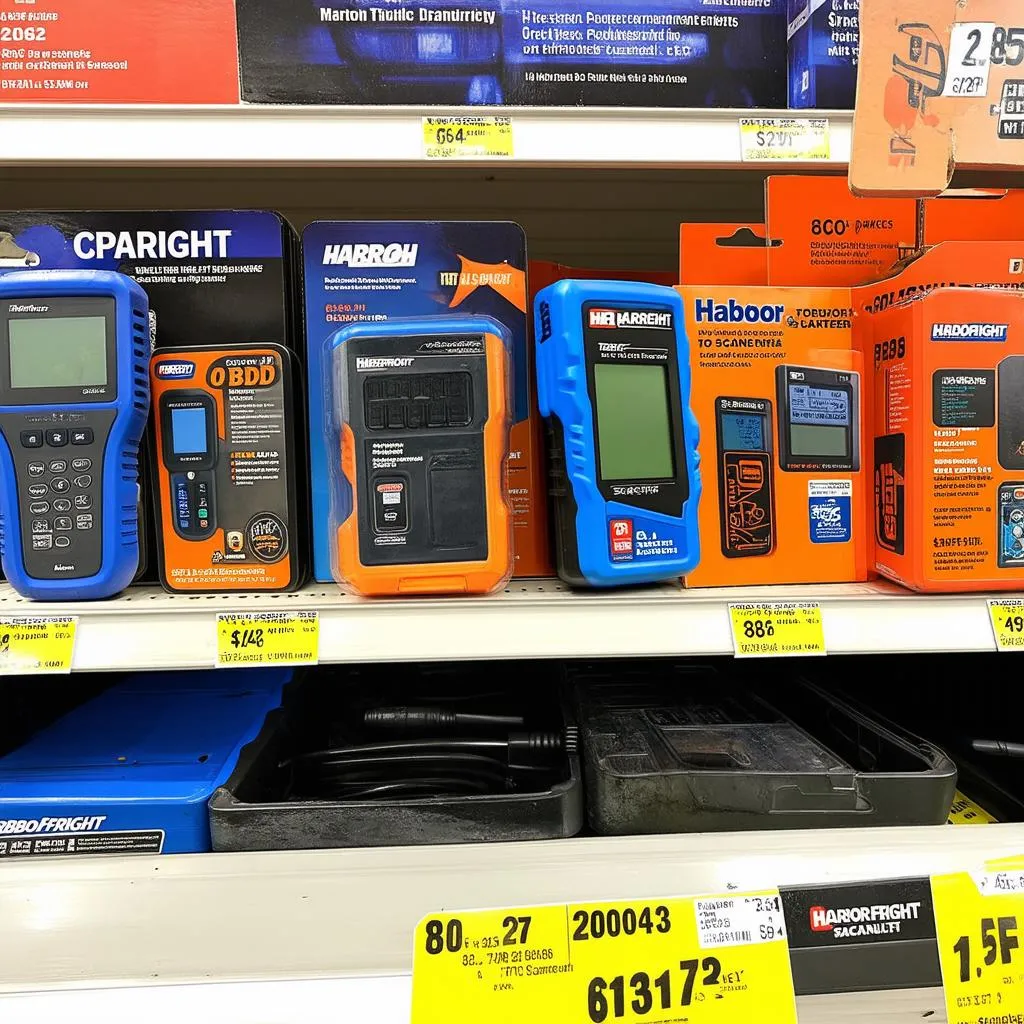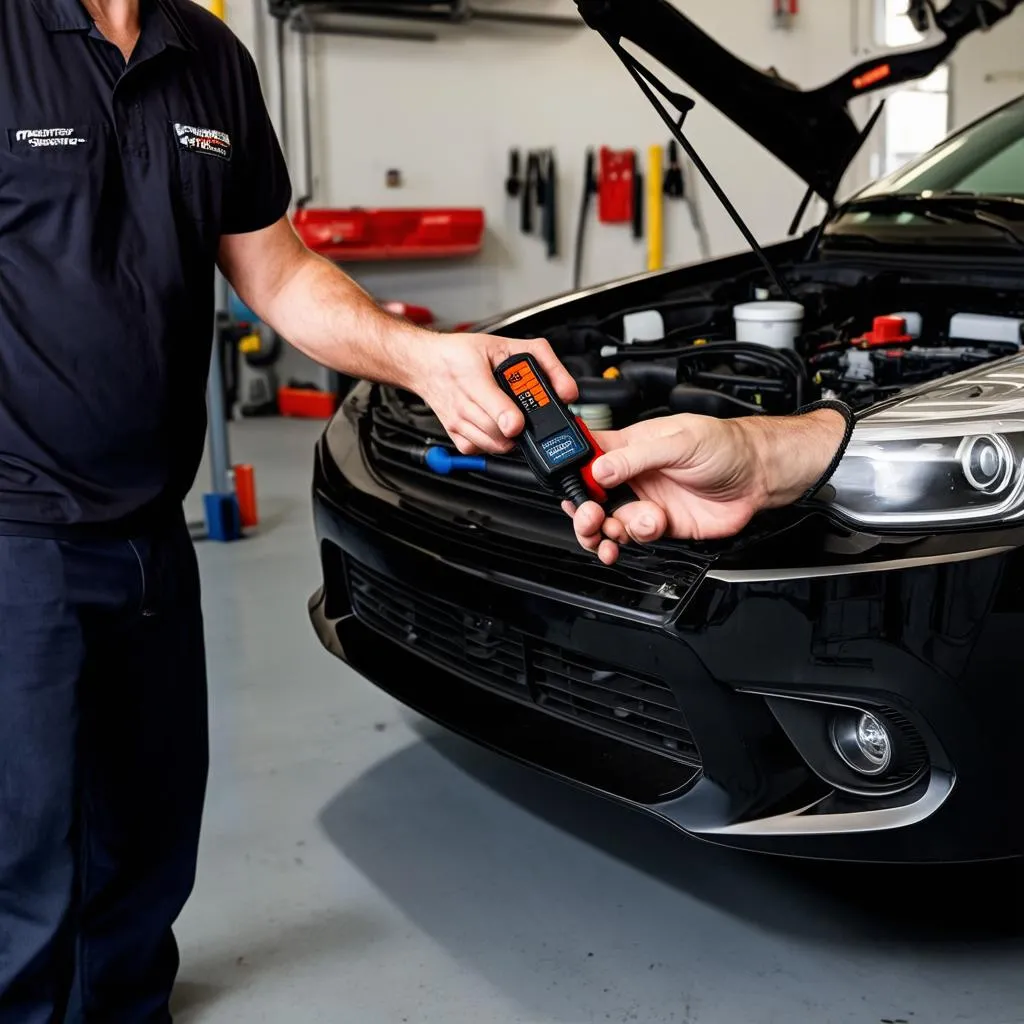“Check engine” light staring you down like a disapproving mother-in-law? We’ve all been there. In the old days, this meant a trip to the mechanic, wallet clutched tight, hoping for the best. But times have changed! Harbor Freight Obd scanners have emerged as the DIY mechanic’s best friend, offering a peek under the hood without breaking the bank. But are they worth your hard-earned dollars? Let’s pop the hood and find out.
What Does “Harbor Freight OBD” Even Mean?
Before we dive into the nuts and bolts, let’s decode the jargon. OBD stands for On-Board Diagnostics, a system that’s been mandatory in cars since the early ’90s. Think of it as your car’s inner voice, communicating any hiccups or issues through a standardized code. This code is accessible through the OBD-II port, usually found under your dashboard on the driver’s side.
Now, enter Harbor Freight, the mecca for budget-conscious tool enthusiasts. They offer a range of OBD scanners, from basic code readers to more advanced models with bells and whistles. But remember, just like that “feng shui” rearrangement you tried (we’ve all been there), the key is choosing the right tool for the job.
Decoding the Harbor Freight OBD Lineup
Walking into Harbor Freight can be overwhelming, a bit like trying to choose a lucky charm at a bustling market. Let’s break down their OBD offerings to help you navigate the choices:
1. Basic Code Readers:
These are your entry-level players, perfect for the casual car owner. They can read and clear basic engine codes, like that pesky “check engine” light. Think of them as the equivalent of a quick health checkup for your car.
2. Enhanced Code Readers:
Want more than just the basics? These models offer live data streaming, allowing you to monitor parameters like engine RPM, coolant temperature, and oxygen sensor readings in real-time.
3. Professional-Grade Scanners:
Harbor Freight also offers more advanced scanners with features like ABS and airbag system diagnostics, bi-directional control (allowing you to test certain components), and even coding capabilities.
Are Harbor Freight OBD Scanners Really Any Good?
Here’s the million-dollar question (or, hopefully, the much-less-than-million-dollar question, considering Harbor Freight’s prices). The answer, as with many things in life, is: it depends.
Pros:
- Budget-Friendly: Harbor Freight scanners are significantly cheaper than professional-grade options, making them accessible to DIYers.
- User-Friendly: Most models boast a simple interface, even for those who aren’t tech-savvy.
- Wide Range of Options: From basic code readers to more advanced scanners, there’s a Harbor Freight OBD tool for various needs.
Cons:
- Limited Functionality: While suitable for basic diagnostics, some models might lack the advanced features professional mechanics require.
- Durability Concerns: Some users have reported durability issues with certain Harbor Freight scanners. Always check reviews and consider the warranty.
- Software Updates: Unlike some professional scanners, updates might not be as readily available or free.
 Harbor Freight OBD Scanner Lineup
Harbor Freight OBD Scanner Lineup
Common Questions About Harbor Freight OBD Scanners
Let’s address some frequently asked questions about these handy tools:
Q: Will a Harbor Freight OBD scanner work on my car?
A: Most Harbor Freight scanners are compatible with cars manufactured after 1996 that comply with OBD-II standards. However, it’s always best to double-check compatibility with your specific make and model.
Q: Can I use a Harbor Freight scanner to reset my oil light?
A: Yes, many Harbor Freight OBD scanners can reset basic maintenance reminders, including oil life indicators.
Q: Can I trust a cheap OBD scanner?
A: While cheap doesn’t always mean bad, it’s crucial to choose a reputable brand like those often found at Harbor Freight. Read reviews and do your research before purchasing.
Finding Your Automotive Zen with the Right OBD Scanner
Choosing an OBD scanner can feel like navigating a maze of technical terms and features. Remember, the best tool is the one that meets your needs and budget. If you’re just looking to decipher those cryptic engine codes and perform basic maintenance, a Harbor Freight scanner might be your perfect match. However, if you’re a professional mechanic or require advanced diagnostics, investing in a higher-end scanner is advisable.
And remember, even with the best tools at your disposal, sometimes a little expert help is needed. If you’re ever in doubt or facing a particularly stubborn car issue, don’t hesitate to reach out to a professional. After all, even the most seasoned mechanic knows when to call for backup.
Explore More Automotive Insights
Interested in learning more about car maintenance, diagnostics, or other tools of the trade? Check out these related articles:
 Mechanic Using OBD Scanner
Mechanic Using OBD Scanner
Need help with your diagnostic tools or have a burning car question? Don’t hesitate to contact us via WhatsApp at +84767531508. Our team of automotive experts is available 24/7 to assist you.
